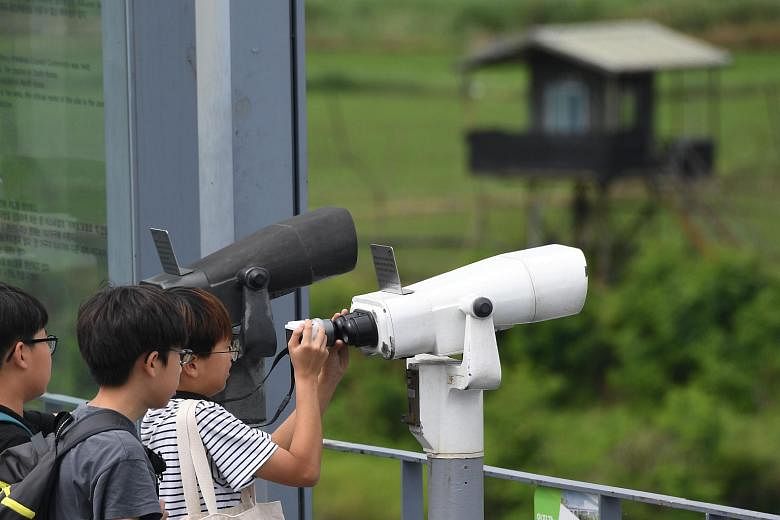SEOUL (THE KOREA HERALD/ASIA NEWS NETWORK) - Ms Jang Ka-yoon, a 27-year-old office worker in Seoul, had thought about leaving her home country after watching TV news reports on the worsened security situation upon threats exchanged between North Korea and the United States last year.
Fluent in English, Ms Jang said she had imagined herself living in Canada or New Zealand, as both countries are known to have good environments for education and high living standards, if she had to choose to leave the country in case of an imminent war.
Like Ms Jang, more young Koreans said they had considered seeking refuge abroad or emigration, amid the deteriorating security situation on the Korean Peninsula before Inter-Korean summit talks this year, compared to people in their 50s and 60s that include those who experienced the 1950-53 Korean War, a survey showed on Tuesday (Aug 14).
In the survey of 1,000 people nationwide by The Korea Herald, 27.9 per cent of respondents aged between 19 and 29 said they had considered emigration, while 20.8 per cent of respondents in the same age category said they had thought about evacuating. Nearly one-quarter of 30-something respondents also thought about emigration, while 17.4 per cent said they considered leaving.
Ms Oh Su-hyun, a 37-year-old mother in Seoul, said leaving the country was the first thing that came to mind when the security situation worsened last year.
Despite the reconciliatory mood developing between Seoul and Pyongyang, she remains mentally prepared in case the mood changes. "We need to better prepare ourselves. I would consider leaving for the US or Japan, or even South-east Asian countries for the safety of my family."
In contrast, people in their 50s and 60s said they had not really thought about it.
More than 80 per cent of respondents aged between 50 and 59 said leaving the country amid a worsening security situation - emigration or seeking refuge abroad - was not an option for them.
Around 71 per cent of people aged 60 and above also said they had not considered leaving the country.
But the urge to emigrate, more common among the younger generation, may not entirely derive from the North Korea issue, according to experts, as young Koreans may be more influenced by insecure economic and social circumstances than the older age group.
"People in their 50s and 60s have little choice because they have established their lives here already. Starting afresh overseas, for them, could be considered as troublesome," said sociology professor Im Woon-taek at Keimyung University.
"For young people, on the other hand, there already exists instability for them in terms of society and the economy. and their desire to emigrate has been amplified by the North Korea threat," he said.
By gender, men were not as interested in leaving the country as women. Nearly 70 per cent of male respondents said they had never given a thought to leaving South Korea for good, while fewer women or 61.8 per cent, said they had not.
By region, 77.6 per cent of people who live in South Gyeongsang Province, including Busan and Ulsan - the farthest cities from Pyongyang, except for Jeju Island - were not interested in leaving the country. The percentage of people who had not considered leaving their homes was lower among respondents living in Seoul.
The Korea Herald survey was conducted in partnership with a local research firm, JoWon Communication Innovation, between Aug 10 and 12.
The survey also found that the majority of South Koreans consider complete denuclearisation of North Korea an unlikely outcome, despite largely agreeing with the Moon Jae-in administration's engagement policy.
In the survey, 73 per cent of the respondents said that North Korea is unlikely to completely denuclearise.
Among them, 29.3 percent said they expect North Korea to renege on its promise, while 43.7 percent said only partial denuclearization would be achieved.
The results also showed that those aged between 19 and 29 - the youngest group in the survey - are most likely to be sceptical, with 36.4 per cent saying that North Korea will backtrack, and 42.4 per cent saying that only partial denuclearisation will take place.
In considering whether North Korea is likely to break its promise, the youngest group was followed by those aged 60 and above with 33.2 per cent of respondents, and by those in their 50s with 32.8 per cent.
Although the survey's respondents had mixed feelings towards Seoul's North Korea policies, and the likelihood of denuclearisation, most appear to agree that the security situation on the Korean peninsula has improved in recent months.
According to the survey, 68.3 per cent said that the situation has improved in varying degrees since the inter-Korean and US-North Korea summits, while less than 30 per cent said the situation remains unchanged.

